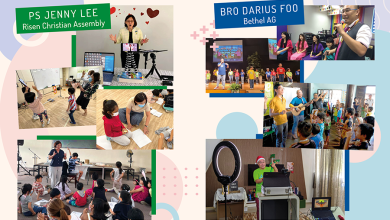
For a church to be healthy, one of the programs that needs to be set in place is the church education program. Seeing beyond just knowledge accumulation, what are the needs we need to access as we design one? Ps Tan Yunyun brings our focus to these needs.
In my first year as a full-time youth worker, I wanted to plan for some CE (Church Education) classes. To my surprise, the response from the leaders was lackluster. One commented that the youths are already in school from Mondays to Fridays, and most of them still have tuition classes after school; should the church still be planning for more classes? I thought that sounded like a fair point.
The Need for CE Program
Reading has fallen out of favor with the modern man. Does this imply that CE programs are no longer relevant in the modern church? Is it no longer fair to expect believers to love reading the bible?
A simple search through Scriptures would quickly reveal a loud “No” (2 Timothy 3:16; Matthew 28:19-20; Hebrews 4:12). God’s word is still alive and very much relevant to believers today! Psalm 1:1-3 describes the one “whose delight is in the law of the Lord, and who meditates on his law day and night” as being “blessed”. And this person “is like a tree planted by streams of water, which yields its fruit in season and whose leaf does not wither— whatever they do prospers”. Wouldn’t this be the dream of every church leader for our members?
God’s word is still alive and very much relevant to believers today!
The Need for Vibrant vs Attractive CE Program
In our well-intentioned efforts to make God’s word more appealing and relatable, it might be tempting to come up with CE programs which are attractive but powerless in transforming lives (cf. 2 Timothy 3:7; 4:3-4).
When I encountered a lack of interest to CE, I tried to make things easier so that the youths would be more receptive to it. For example, instead of emphasising the importance of scripture memory, I shared that memorising scriptures can be an optional discipline. Until one day, God convicted me that I am shortchanging the youths. When I fail to challenge them to God’s call, I am depriving them of God’s prize.
In short, the uptake or popularity of the program should not be the sole indicator of its success. More importantly, we need to discern if the program has been effective in growing the faith and the witness of the believers.
For ideas on the possible objectives in an effective curriculum, consider “Seven Dimensions of a Spirit-Filled Disciple”[1]. Developed in 2022 by The General Council of the Assemblies of God, this discipleship outcomes guide “sets forth a framework of Spirit-empowered discipleship dimensions, outcomes, and practices that are adaptable according to the culture and needs of any church and any discipleship strategy.”[2] Compared to choosing CE resources in a haphazard manner, having such a framework can help churches to be strategic and stay the course in their discipleship efforts.
With the curriculum framework planned out, are there other factors that go into creating vibrant CE programs? Below are some insights from a pastoral perspective.
More importantly, we need to discern if the program has been effective in growing the faith and the witness of the believers.
The Need for Relational Teachers
God’s plan for discipleship starts in the family and everyday living (Deuteronomy 6:4-9). In the Gospels, we see Jesus teaching His disciples as they journeyed together for three years. It is crucial for the teacher to be part of the students’ lives. Should subject experts be invited to teach a particular topic, it is still important for trusted teachers, mentors or leaders in the local church to follow up on the lesson and provide accountability. Such follow-ups might be done through small groups.
CE programs can also consider equipping parents to teach God’s word at home to their children. Curriculums found in The Bible Engagement Project App[3] is a possible resource. The curriculums have lessons developed for different age groups: adults, youths, kids and even family devotions meant for parents to do it with their children.
The Need to Encounter Christ
Jesus is the Word of God (John 1:1; Revelation 19:13). Is it possible then for His disciples to love Jesus and complain that the Bible is boring and irrelevant? The study of scriptures is never about knowledge or information accumulation. It is about God’s revelation and our transformation. It is about encountering Jesus in the bible. Does our CE program help people see Jesus in the bible? Does it connect us with Jesus and to love Him more? Imagine how vibrant CE program would have been if every lesson is a road to Emmaus experience (Luke 24:32)!
The study of scriptures is never about knowledge or information accumulation. It is about God’s revelation and our transformation.
The Need for the Holy Spirit
The Holy Spirit is “the Advocate” who will teach us all things (John 14:26). He is the “Spirit of Truth”, who guides us into all the truth (John 16:3). His “anointing teaches us about all things” (1 John 2:27). He helps us “understand what God has freely given us” and to explain “spiritual realities with Spirit-taught words” (1 Corinthians 2:12-16).
The Holy Spirit is the Master Teacher. Our role is to partner with Him. Oftentimes, this partnership involves prayer. Sometimes, it involves stepping out in faith and obedience for Him to work in our students’ lives. During the planning and execution of a CE programme, it is easy to rely solely on our intellect and experience, while neglecting the Holy Spirit. May God’s leaders be able to say as Paul did in 1 Corinthians 2:4, that our teaching “were not with wise and persuasive words, but with a demonstration of the Spirit’s power, so that your faith might not rest on human wisdom, but on God’s power”!
[1] Download this pdf guide from https://discipleship.ag.org/7-Dimensions
[2] “Seven Dimensions of a Spirit-Filled Disciple.” The General Council of the Assemblies of God, 2022, 4. https://discipleship.ag.org/7-Dimensions
[3] https://bibleengagementproject.com/

Ps Tan Yunyun is a licensed minister with AG Singapore and serves in the NextGen Commission. Having answered God’s full-time call to Zion Full Gospel Church in 2013, she had served in the Youth Ministry, Young Adults Fellowship, Royal Rangers program and Christian Education program for the past 11 years. Since May 2025, she serves part-time as an Associate Team Enabler with ChurchLife Resources, a team of pastors and staff with pastoral experiences who desire to partner pastors and leaders of local churches to develop healthy and growing churches. She has a Master of Divinity with Acts College, Singapore.




